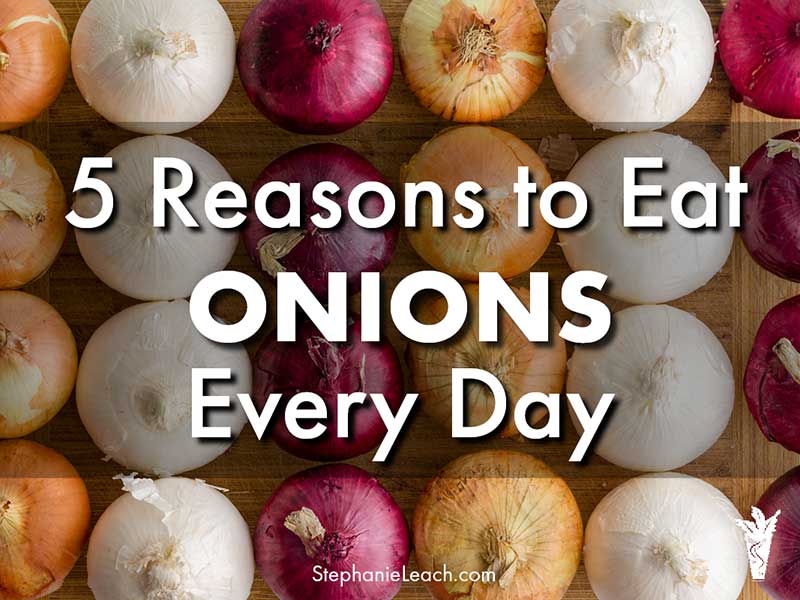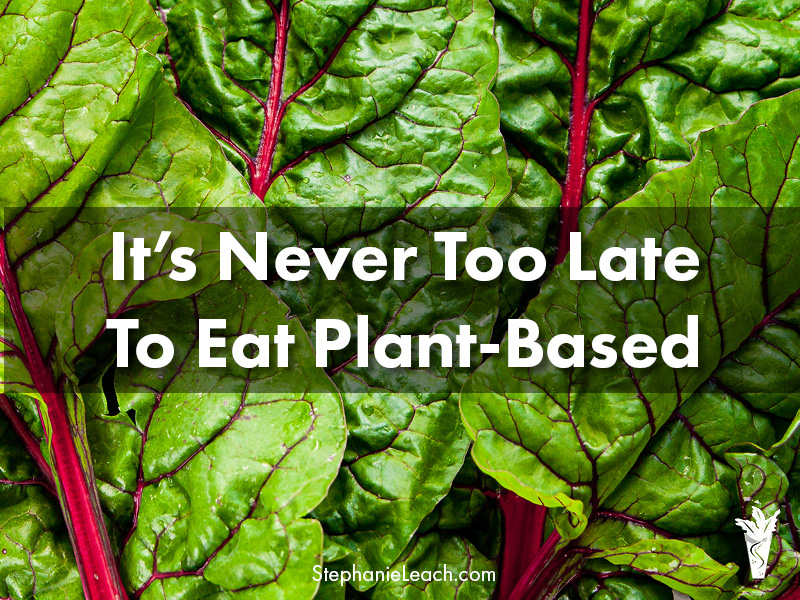Onions are more than the perfect aromatic beginning of a delicious meal. The unique phytonutrients in onions make them anticancer, antioxidant and anti-inflammatory, delivering many health benefits across the body.
The onion is a member of the allium family of vegetables that includes garlic, leeks, shallots, chives and green onions (scallions.) The benefits of onions shared here extend by varying degrees to these other allium veggies.
Here are 5 reasons why many nutrition experts and physicians like Joel Fuhrman, M.D. recommend eating onions every day.
#1 – Eat Onions to Lower Your Risk of Cancer
Epidemiological studies show that increased consumption of onions and other alliums is associated with reduced risk of all kinds of cancers.
In one case-controlled multi-country study, the individuals eating the most onions had far lower cancer rates compared to those that rarely at onions.
- Colon Cancer – 56% reduction
- Ovarian Cancer – 73% reduction
- Prostate Cancer – 71% reduction
- Esophageal Cancer – 88% reduction
- Stomach Cancer – 50% reduction
The organosulfur compounds in onions and alliums slow tumor growth and kill cancer cells.
How much onion do you need to eat to reduce your cancer risk?
In this study, the “highest” consumers of onions were eating the equivalent of about a ½ cup of chopped onion per day. The “lowest” consumers were eating less than one serving per week.
For such a great reduction in cancer risk, eating a ½ cup of onions per day seems certainly worthwhile and doable.
#2 – Eat Onions for Cardiovascular Health
Most of the research available specifically on onions are animal studies. These studies show that the sulfur compounds in onions may help un-clump blood platelets, lower cholesterol and triglycerides, and improve the function of the cell membrane in red blood cells.
The studies available on humans are around the benefits of onion-containing diets. Most people couldn’t tell you how much onion they are consuming, since onions are often hidden, and the amount is not easily recognized in a cooked meal.
But we know that onions are highly anti-inflammatory and antioxidant – two things that are very important to cardiovascular health. Chronic oxidative stress and chronic inflammation inside our arteries is linked to increased risk of cardiovascular diseases, including atheroschlerosis, which is the build-up of fats, cholesterol, and other substances in and on the artery walls.
By eating onions and other allium veggies, we can reduce this oxidative stress and inflammation, and improve our cardiovascular health.
#3 – Eat Onions to Reduce Inflammation
As mentioned, there are some unique anti-inflammatory phytonutrients in onions. One of these is onionin A (very creative,) a sulfurous compound found in the bulb part of onions. This compound has been shown to inhibit the activity of macrophages, a type of white blood cell.
Macrophages can trigger large-scale inflammatory responses, which is not always desirable. In animal studies and in the lab, onions can help calm an overly active inflammatory response.
If you are dealing with painful inflammation, add some onions to a plant-strong diet and see if you feel better.
#4 – Eat Onions for a Healthy Weight and Blood Sugar Control
Onions, especially red onions, contain quercetin which has been shown to improve blood sugar balance in animal studies.
Quercetin in onions may also improve the mitochondrial function in skeletal muscle, thereby improving insulin sensitivity and glucose tolerance. These are key functions that influence the risk of obesity. It’s an interesting area of research, for sure.
#5 – Eat Onions for Antibacterial Benefits
While we may think of garlic first when it comes to antibacterial foods, onions should not be overlooked. The sulfurous compounds in onions have been shown to kill the bacteria responsible for cavities and gum disease. Only freshly chopped, raw onions worked though.
How to Enjoy Onions
To get the most health benefits, remove the least amount of edible onion when peeling it. The flavonoids in onions are most present in the outer peels. Over-peeling a red onion, for instance, can reduce the quercetin by 20% and anthocyanins by 75%.
With so many health benefits, you may be wondering how you can get more onions into your diet.
- Add raw, chopped, sliced or diced yellow, white, red or green onions to salads, dips, salsas and salad dressings.
- Toss some sliced green onions (scallions) onto cooked rice and soups.
- Add thinly sliced onions to a veggie sandwich.
- Try doubling up on the amount of diced onion in cooked dishes.
Onions can be an acquired taste, especially raw onions. If you find yellow and white onions too sharp for your palate, try red onions (fresh pickled is nice,) sweet varieties when they are in season, or green onions instead.
When cooking onions, use the water sauté method. Oil damages the lining of our arteries, and it’s not needed to cook them. (For more info on oil, read 5 Big Reasons to Switch to Oil-Free Salad Dressings. ) Just add a couple of teaspoons of water to your skillet with the onions and sauté as usual. The onions will release some of their own liquid, and you can add more water in small amounts as needed to prevent sticking.
Onions are an important part of a healthy whole food, plant-based diet. If you’d like to learn more about this way of eating, please download my Whole Food Plant-Based Diet & Lifestyle Action Guide.
Sources:
http://whfoods.com/genpage.php?tname=foodspice&dbid=45
https://www.drfuhrman.com/get-started/eat-to-live-blog/62/the-healthiest-anti-cancer-foods-g-bombs









Leave A Comment